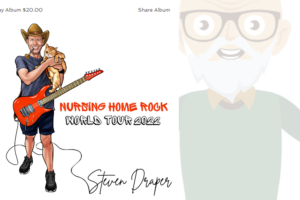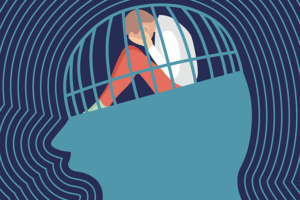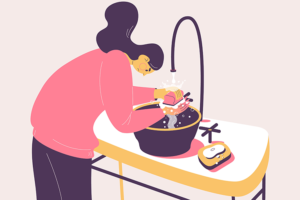According to the Centers for Disease Control and Prevention (CDC), loneliness is defined as the “feeling of being alone, regardless of the amount of social contact.” This is somewhat different than social isolation, which is a lack of social connections — which can lead to loneliness in some people, while others can feel lonely without being socially isolated.”
In recent years, this feeling has grown from a stressor to a full-fledged health issue. The U.S. Surgeon General recently called loneliness and isolation an “epidemic.” Loneliness causes increased risk of serious physical illnesses and, for those who aren’t already experiencing mental health problems separately, mental illness, including depression and anxiety, thoughts of self-harm and mortality. It can also lead to higher rates of hospitalization.
Both loneliness and social isolation are part of the everyday life of many people living with serious mental illness (SMI). In fact, research shows that people with SMI experience loneliness at over twice the rate of the general population.
As someone living with SMI, I can relate to this painful reality. I have experienced loneliness and social isolation for extended periods of time since I was diagnosed with serious mental illnesses. I sometimes miss the social life I once had and the friends I lost, including my best friend of over 20 years. As I’ve navigated my mental health challenges, I’ve become accustomed to a much smaller circle of friends — but these are true friends. My illness has posed many challenges, but it has also revealed who sticks by me during tougher times.
What Does It Feel Like To Be Lonely?
The UCLA Loneliness Scale, the leading instrument to measure one’s subjective feelings of loneliness and social isolation can help identify what it feels like for some people to be lonely. Below are some of the items on the scale.
- I have nobody to talk to
- I feel as if nobody really understands me
- There is no one I can turn to
- I am no longer close to anyone
- My interests and ideas are not shared by those around me
- My social relationships are superficial
- It is difficult for me to make friends
- I feel shut out and excluded by others
Many people with SMI experience often experience loneliness and social isolation due to the stigma surrounding our illness. Some of us have lost “friends” who refused to associate with someone with mental illness. Others have seen friends withdraw because they don’t understand mental illness and don’t want to make the effort to learn about it. Some simply could not be bothered to “deal” with someone with “emotional issues.” Those of us grappling with SMI may also push away friends and family and withdraw, largely due to the shame and embarrassment over our illness and actions when ill.
How To Connect With People With SMI Experiencing Loneliness
If you know someone who has SMI who was once in regular contact with you and has ceased communication, don’t assume they don’t want to connect. There’s a good chance, they might be missing you.
Here’s a few tips to help you reconnect or connect with someone living with SMI:
Reach out
Check in with a brief text message: “I’m thinking about you,” “I miss you,” “I was wondering if you’d like to get together,” “I am always here for you” or simply send them an emoji. Invite them to events so as not to make them feel left out or unwanted. Make them feel missed and tell them they are missed.
Show you care
Drop by their home with a care package or a home cooked meal (or have one delivered) and do other acts to remind them how important they are to you, such as offering to help with errands. Tell them why you consider them to be a good friend or loved one and remind them of why they’re special and valued. Ultimately, it’s important to help them sense that they matter. Do so repeatedly as people with SMI often have low self-esteem.
Practice understanding
Forgive them for past acts, recognizing that SMI can make us do things unintentionally. If they ask for forgiveness, tell them that you understand. Make sure you don’t make them feel like a burden. Refrain from talking about events that may have been embarrassing to them. Let them bring up the topic of mental illness as they may feel awkward or uncomfortable speaking about it.
Learn about SMI, and, if you don’t understand something, ask the person what it’s like if they seem open to talking about it. Watch their body language for signs of discomfort and gently act on it. Validate their pain and suffering. Listen more and talk less. Sometimes just being there, in silence, is more helpful. Always show genuine empathy, concern and understanding.
Give them a chance to be a friend to you
Make sure relationships are reciprocal. People with SMI make good friends. Recognize the impact of the need to be needed. Ask them for help.
Help dispel stigma
Remind them of how many people live with mental illness (1 in 5) and that people with SMI can live full lives. Be extremely sensitive when you speak to them. Many people with SMI have heightened sensitivity to stigma.
How People With SMI Can Connect With Others
For people with SMI experiencing loneliness and social isolation, there are several options that can help you connect with others. However, it must be acknowledged that connecting with others can be very hard. For connecting with friends and family, reach out to those who care for you and let them know you are feeling lonely. Some people may be more empathetic than you think.
Take advantage of social networks. There are many online mental health peer support communities to turn to, such as: ForLikeMinds, 7 Cups, Emotions Anonymous, Support Groups Central, Therapy Tribe, Support Groups and PsychCentral.
Many social media accounts can be very supportive. I am very proud of my own: ForLikeMinds Facebook page, which I created to support people living with SMI and their families. There are also several great Instagram accounts I like. Some of my favorites, include: avamariedoodles, blushing.ginger, chibird, daylightillustrations, iamhayleykaye, innsightful_, joybelleco, ladybluebottle, lindseys.lettering, nikkimiles, positivelypresent, selfcareexpress, selfcarespotlight, sketchesinstillness, theresgoodinstore, wonder_doodles
Clubhouse participation can also be extremely helpful. According to research by Fountain House, the clubhouse promotes a sense of unity, belongingness and connection. You can find a directory of Clubhouses here.
You can try calling a warmline, where you can talk to trained peers.
You can also work, volunteer, take a class, enroll in a NAMI peer-to-peer class, attend DBSA’s online support groups, engage in social activities and frequent places where you’ll be around others, like a dog park or gym.
We can’t cure loneliness and social isolation, but we can certainly reduce it. People with SMI make wonderful friends and can offer caring companionship, especially because we know what it feels like to be lonely. Many of us are blessed with heightened empathy. I strongly encourage friends, loved ones and strangers to reach out to us and share a little humanity.
Katherine Ponte is happily living in recovery from severe bipolar I disorder. She’s the Founder of ForLikeMinds’ mental illness peer support community, BipolarThriving: Recovery Coaching and Psych Ward Greeting Cards. Katherine is also a New York Certified Peer Specialist-Provisional and a faculty member of the Yale University Program for Recovery and Community Health and has authored Your Mental Health Recovery Workbook: A Workbook to Share Hope. She is on the NAMI-NYC Board.




